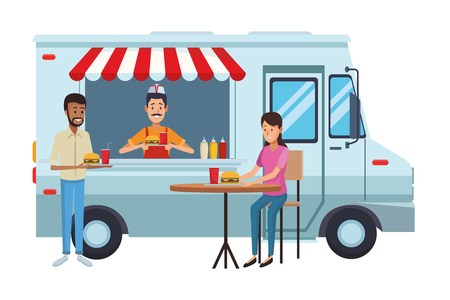Introduction to UK Food Hygiene Legislation
For every aspiring food truck owner or catering startup in the UK, understanding food hygiene regulations is not just a box-ticking exercise—its a cornerstone of running a reputable and legally compliant business. The UKs food hygiene laws are designed to protect public health, promote fair trading, and maintain consumer confidence in the food industry. Whether you’re serving gourmet burgers from a van in Shoreditch or running a mobile coffee bar at local festivals, you are required by law to adhere to strict standards set out primarily in the Food Safety Act 1990, the Food Hygiene (England) Regulations 2013, and similar legislation across Scotland, Wales, and Northern Ireland. Compliance with these laws means more than simply avoiding fines or penalties; it’s about building trust with your customers, safeguarding your brand’s reputation, and ensuring that your business can thrive in a highly competitive market. For UK startups in mobile catering, a strong grasp of food hygiene legislation is an essential first step towards sustainable growth and long-term success.
2. Essential Licences and Registrations
Before firing up your grill or serving your first artisan coffee, understanding the maze of essential licences and registrations is crucial for every UK food truck or catering startup. Local councils are strict about compliance, and missing out on even one requirement can result in hefty fines or forced closure. Below, we break down the key registrations and permits you’ll need to operate legally and confidently in the UK.
Registering with Your Local Council
All food businesses must register with their local council at least 28 days before opening. This is a legal requirement under UK law—even if you’re running a mobile food business or pop-up. Registration is free but mandatory, and failure to do so can lead to prosecution. The process involves providing details about your business type, location(s), and expected activities. Councils may also conduct an initial inspection to ensure your setup meets hygiene standards.
Street Trading Permits
If you plan to trade on public streets or markets, a street trading permit is essential. These are issued by local authorities and requirements may differ depending on the borough or city. Some councils limit the number of available pitches, so early application is advised. Permits typically specify where, when, and how you can trade—so read all conditions carefully.
Types of Documentation Required
| Document | Purpose | Responsible Authority |
|---|---|---|
| Food Business Registration | Legal registration to operate as a food business | Local Council Environmental Health Department |
| Street Trading Permit | Permission to sell food on public land/streets | Local Council Licensing Team |
| Public Liability Insurance | Covers accidents/injury claims from customers | Insurance Provider (required by many councils) |
| Gas & Electrical Safety Certificates | Proof of safe equipment for cooking/serving food | Certified Engineers (check with local authority) |
| Food Hygiene Certificates (Level 2 or above) | Evidences staff have completed basic hygiene training | Accredited Training Providers (endorsed by FSA) |
Key Takeaways for Startups:
- Start early: Some applications can take weeks to process.
- No shortcuts: Operating without proper permits can shut down your business overnight.
- Stay informed: Local regulations may change—subscribe to council updates relevant to your area.
- Keep documentation accessible: You may be asked to present these documents at any time during inspections.
Ticking off each of these licensing steps not only keeps your venture compliant but also signals professionalism and trustworthiness—key ingredients for building a reputable street food brand in the UK’s vibrant culinary scene.

3. Maintaining Food Safety Standards on the Move
Operating a food truck or mobile catering business in the UK comes with unique challenges when it comes to upholding strict food hygiene standards. Achieving and maintaining a high food hygiene rating requires more than compliance; it demands proactive, daily action tailored to life on the move.
Temperature Control: The Bedrock of Safe Service
Consistent temperature control is non-negotiable in mobile catering. All chilled foods must be kept below 8°C, while hot foods should be held above 63°C until service. Invest in reliable, easy-to-read digital thermometers and regularly check both storage units and prepared dishes. Document every check – not only does this reassure inspectors, but it also helps you spot potential issues before they become costly mistakes. For added peace of mind, consider using temperature log books or digital monitoring systems tailored for mobile operations.
Cross-Contamination Prevention: Small Space, Big Discipline
With limited prep space, preventing cross-contamination takes real discipline. Use colour-coded chopping boards and utensils for different food groups—raw meats, cooked foods, vegetables, and allergens—to avoid dangerous mix-ups. Clean down surfaces between tasks using approved sanitisers and always store raw ingredients below ready-to-eat items in fridges. Train your team to change gloves and wash hands religiously after handling raw food or allergens. These small, consistent actions make a big difference during Environmental Health Officer (EHO) inspections.
Allergen Management: Protecting Every Customer
Food allergies are taken extremely seriously by UK authorities and consumers alike. You must know exactly what goes into every dish, including sauces, marinades, and garnishes. Keep a clear and accessible allergen matrix for all menu items, and ensure staff can confidently answer customer questions about ingredients. Display allergen information clearly at your serving window—this isn’t just best practice; it’s required under Natasha’s Law for pre-packed foods.
Mobile-Specific Hygiene Hacks
In the hustle of a busy event, even experienced operators can slip up. Prepare for the unexpected: stock plenty of cleaning supplies, anti-bac wipes, spare gloves, and backup hand sanitiser dispensers. Consider portable hand-washing stations if your vehicle doesn’t have plumbed sinks. Encourage a ‘clean as you go’ culture—quick wipes between customers keep your workspace safe and impress diners watching from outside the hatch.
The Takeaway
Consistency is key: embed these practices into your daily routine so they become second nature for everyone on board. This not only ensures compliance with UK regulations but builds a reputation for quality that keeps customers coming back—and local authorities on your side.
4. Staff Training and Legal Responsibilities
Ensuring your staff are properly trained in food hygiene is not just good practice—its a legal requirement for all UK food businesses, including food trucks and catering startups. The Food Safety Act 1990 and the Food Hygiene (England) Regulations 2013 clearly state that anyone handling food must receive adequate training in food safety relevant to their duties. As an employer, you have a duty of care to ensure every team member understands how to handle, prepare, and serve food safely, minimising the risk of contamination or foodborne illness.
Understanding Your Legal Obligations
Employers must ensure that all staff—whether full-time, part-time, or temporary—are supervised and instructed in safe food handling procedures. This includes everyone from chefs and kitchen assistants to those serving customers at the counter. Failure to provide this training can result in hefty fines, closure notices, or even criminal charges if negligence leads to harm.
Recommended Certifications
The most common way to demonstrate compliance is through accredited food hygiene certificates. While there is no strict legal requirement for specific courses, most local authorities recommend at least a Level 2 Food Hygiene Certificate for anyone involved in food preparation or service. Higher levels may be required for supervisors or managers.
| Role | Recommended Training Level | Description |
|---|---|---|
| Food Handler (General Staff) | Level 2 Food Hygiene Certificate | Covers basic principles of food safety and hygiene relevant to daily operations. |
| Supervisors/Managers | Level 3 Food Hygiene Certificate | In-depth understanding of managing food safety systems and supervising teams. |
| Business Owner/Operator | Level 3+ (or equivalent) | Comprehensive knowledge for setting standards, policies, and ensuring compliance. |
Ongoing Training & Record Keeping
Training should not be a one-off event; it needs refreshing regularly to keep up with best practices and changes in legislation. It’s also wise to maintain detailed records of each staff member’s training history, as environmental health officers will often request proof during inspections.
Your commitment to robust staff training not only keeps you on the right side of the law but also builds trust with your customers and strengthens your brand reputation within the competitive UK street food scene.
5. Inspections, Penalties, and Best Practices
Every food truck or catering startup operating in the UK will encounter routine inspections by Environmental Health Officers (EHOs). Understanding this process is essential for keeping your business compliant and reputable. EHOs may visit your premises—often unannounced—to assess hygiene standards, cleanliness, food handling procedures, pest control, record-keeping, and staff training. Their assessment determines your Food Hygiene Rating, which is publicly available and can greatly influence customer trust.
What to Expect During an Inspection
During an inspection, EHOs will meticulously check that you’re following all relevant legislation such as the Food Safety Act 1990 and Food Hygiene Regulations 2006. They’ll look for evidence of safe food storage temperatures, proper separation of raw and cooked foods, thorough cleaning routines, allergen management, and accurate documentation. It’s not just about spotless counters—the focus is on your systems and knowledge too.
Consequences of Non-Compliance
If your setup falls short of legal requirements, consequences can range from written warnings to immediate closure of your operation. Fines can be substantial, and serious breaches may lead to prosecution. Perhaps most damaging is the loss of public confidence if you receive a low Food Hygiene Rating, which must be displayed at your premises in many parts of the UK.
Top Tips for Impressing EHOs
To stand out during inspections and build lasting credibility:
- Keep meticulous records—temperature logs, cleaning schedules, allergen information—and ensure they’re easily accessible.
- Train all staff thoroughly in food safety practices and refresh their knowledge regularly.
- Maintain high levels of cleanliness everywhere: work surfaces, equipment, uniforms, and vehicles.
- Be proactive—identify potential hazards before they become issues and address them promptly.
- Engage positively with EHOs; show willingness to learn and improve where necessary.
Consistency is key: creating a culture where good hygiene is second nature will not only satisfy regulatory requirements but also reinforce your brand’s reliability in the eyes of both inspectors and customers.
6. Future-Proofing Your Food Truck Business
Staying ahead in the ever-evolving landscape of UK food hygiene regulations is not just about ticking boxes—its about building a brand that resonates with British values of trust, quality, and transparency. As regulations adapt to new public health challenges and consumer expectations, food truck and catering startups must remain agile and proactive.
Stay Informed and Adaptable
Regularly review updates from the Food Standards Agency (FSA) and your local Environmental Health Officer (EHO). Sign up for regulatory alerts, attend local council briefings, and join industry associations like NCASS for insider knowledge. This positions your business to swiftly implement changes, whether they relate to allergen labelling, temperature controls, or sustainability initiatives.
Invest in Continuous Training
Ongoing staff training is a cornerstone of compliance. Make it standard practice for your team to refresh their food safety knowledge annually. Consider British-accredited online courses or workshops that focus on current best practices—this demonstrates commitment both to authorities and your customers.
Embrace Technology
Utilise digital tools for record-keeping, temperature monitoring, and cleaning schedules. Adopting reliable UK-based apps can streamline compliance tasks and create a robust audit trail, which is invaluable during inspections or if regulations shift unexpectedly.
Build Trust Through Transparency
Share your hygiene ratings prominently on your truck, website, and social media channels. Being open about your food safety standards not only reassures customers but also sets you apart as a responsible British food business. Engage with customer feedback on hygiene proactively—it shows you value their wellbeing.
Champion British Values in Your Brand
Future-proofing isnt solely about compliance; its about cultivating a reputation synonymous with reliability. Align your brand messaging with British values: integrity, quality sourcing, and community engagement. Support local producers where possible and tell those stories—todays consumers value provenance as much as price.
By embedding adaptability into your operations and championing transparent, trusted practices, youll position your food truck or catering startup as a leader in the UKs dynamic street food scene—ready to thrive whatever the future brings.


